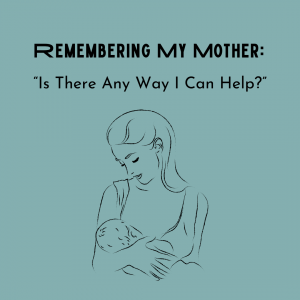 Join me last Friday morning. I’m sitting in the early morning sunlight, looking out at the evergreens, pondering my conversation with my friend Beth. I’ve spent 20 minutes listening to her challenges caring for her ornery, mean-spirited ninety-five-year-old mother. Although my mother had not been mean-spirited, our relationship had been complex. Although it had been a decade since I’d lost my mother, my friend Beth’s pain had triggered my difficulties watching my ninety-three-year-old mother lose her battle with Parkinson’s and dementia.
Join me last Friday morning. I’m sitting in the early morning sunlight, looking out at the evergreens, pondering my conversation with my friend Beth. I’ve spent 20 minutes listening to her challenges caring for her ornery, mean-spirited ninety-five-year-old mother. Although my mother had not been mean-spirited, our relationship had been complex. Although it had been a decade since I’d lost my mother, my friend Beth’s pain had triggered my difficulties watching my ninety-three-year-old mother lose her battle with Parkinson’s and dementia.
No longer alive but never far off my radar.
“If there’s any way I can help, let me know,” I tell Beth as we say goodbye.
My words hang in the silence — they come from me but echo from a faraway place. And suddenly I remember:
It is a sweltering hot June day, 1978. I’d left the Catholic Charities Mental Health Center in Glendale Queens, my internship placement, and was driving into Manhattan to attend a meeting when, sitting in my blue Oldsmobile, stuck in traffic at the Brooklyn Bridge, I hear a splutter. “Oh no,” I think, I wouldn’t want to stall out here. To avoid draining the battery, I turn off the air conditioner and, with a push of a button, my car windows open automatically.
“Lady,” calls a voice from out my window, “You know which direction 22 Water Street is?” Looking out, about to respond to the speaker, I gaze into the dark brown eyes of a tall, husky young man; his colorful bandana catches my eye when… suddenly I hear a swoosh. I turn my head only to realize a hand has entered the open window on the passenger side of the car, grabbed my pocketbook nested on the seat beside me, and now…..
I see the two young men running off to my horror, slipping between the cars ahead of me lined up in bumper-to-bumper traffic.
I don’t really remember how I coped—this was the era before cell phones. I can only imagine I was in shock; my first reaction might have been to freeze in terror. I imagine it didn’t take long before I realize that I’d escaped a fate worse than losing my pocketbook. How long could it have been until I was awash in relief –at least those two hadn’t gotten into my car!
I remember eventually getting to my meeting, calling my babysitter, warning her to double lock the doors, feeling terrified these young thieves would have gotten into my pocketbook, found my keys, and could have gotten into my home—which fortunately was not the case.
After finally getting home that evening and putting my two small children to sleep, I remember calling my mother and telling her about my harrowing experience. After rejoicing that I hadn’t been accosted, assaulted, raped, or victimized in any way, my mother was filled with advice. “You have to replace everything- your driver’s license, registration, credit cards—and don’t forget to change the locks—call a locksmith.” She paused. “And can I help?”
“Can I help? Let me know if I can help… .”
Sitting in the early morning sunlight, I am struck with the power of memory. I haven’t thought about being accosted at the Brooklyn Bridge in years, and whenever I did remember it, I was filled with fear. Now, in this very moment, I am watching how memories shift. I am flooded with a different part of the story, and I am reminded of what I miss about my mother and her legacy: Her goodwill. Her generosity. Her care and concern. Her willingness to help. Her stabilizing presence. A warmth spreads, resonating through my body. Although I have often described my mother as generous and helpful, now, this memory magnifies these qualities that for so much of my life I took for granted, unaware how she had invisibly, silently scaffolded me. As I soak in what has been lingering all along in the recesses of my mind, I am reminded of the mystery of memory and the opening words of my new book, The Girl In the Red Boots: Making Peace with My Mother:
“On the windowsill in my psychotherapy office sits a sand- art picture, a simple black frame filled with colored sand. Each time you shake the frame, the sand shifts seamlessly into a new design.
I keep it there for my patients. When they notice it, I ask them if they’d like to examine it. “Shake it,” I suggest. Then I tell them why I keep it in my office.
“Our minds are like sand dunes, filled with hidden treasures, your stories,” I say. “Every story you have ever lived or imagined is buried inside you, waiting to be revealed as the grains of sand shift and open up new possibilities.”






This is a beautiful tribute to your mother.Thank you for sharing.